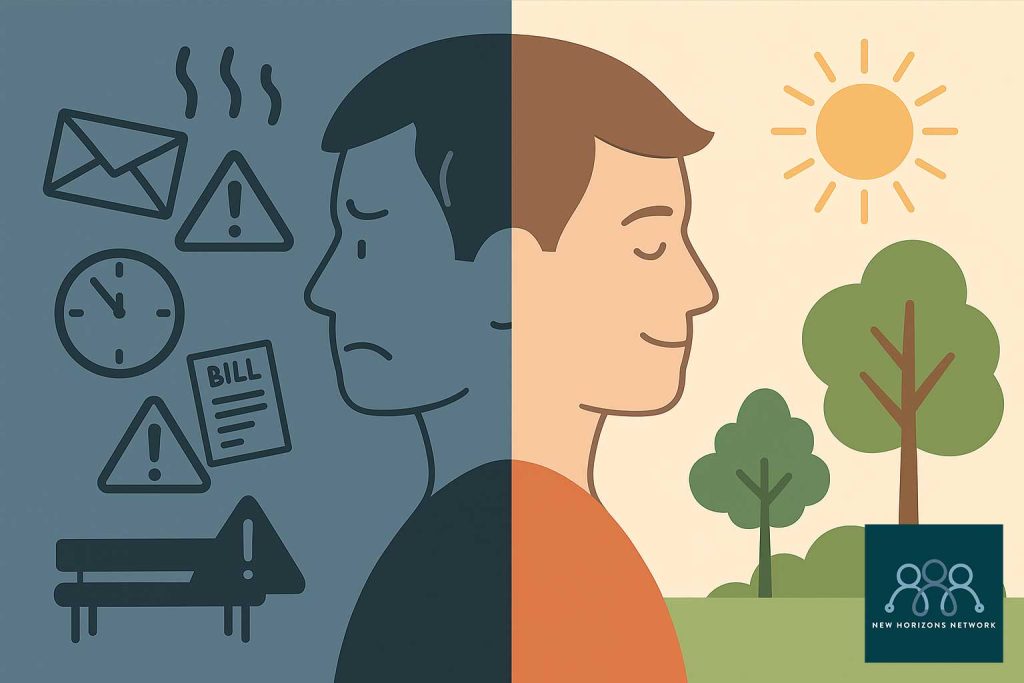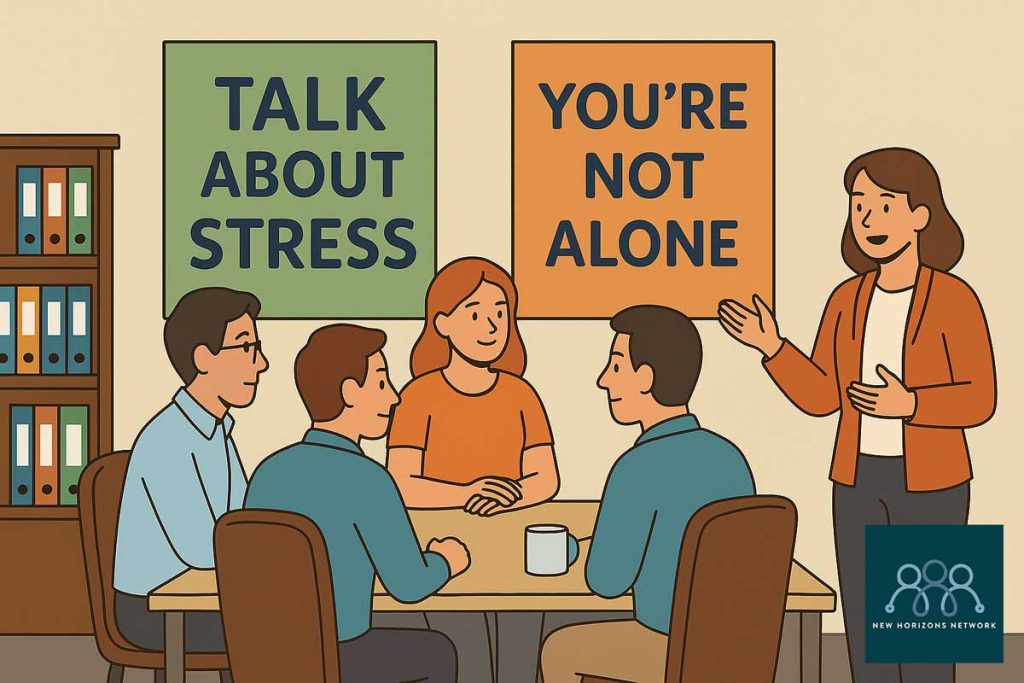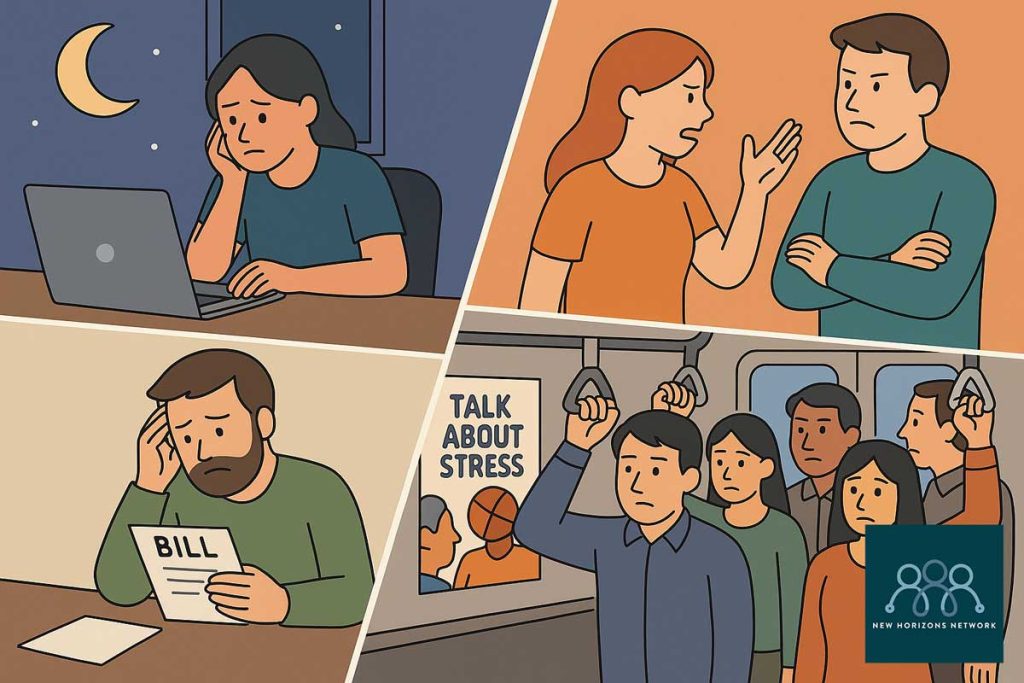National Stress Awareness Day: Understanding and Managing Stress

Introduction: What Is National Stress Awareness Day?
Every year, on the first Wednesday of November, the UK marks National Stress Awareness Day — a vital reminder to pause, reflect, and prioritise our mental wellbeing. Created by the International Stress Management Association (ISMA), the day encourages open conversations about the causes of stress and how we can manage it more effectively.
In 2025, as work demands, digital overload, and financial pressures continue to rise, stress has become one of the most common mental health concerns in the UK. The good news? Stress can be managed with the right tools, self-awareness, and support.
This comprehensive guide explores what stress is, how it affects the body and mind, and practical ways to manage it. We’ll also share how counselling and therapy in Dorset, Bournemouth, Christchurch, and surrounding areas can help you build long-term resilience.
What Is Stress?

Stress is the body’s natural response to pressure or perceived threat. It can be triggered by external situations (like work, relationships, or finances) or internal thoughts (like perfectionism or fear of failure).
A small amount of stress can motivate and energise you — but when it becomes chronic, it can affect your mental and physical health, leading to burnout, anxiety, or depression.
The Importance of National Stress Awareness Day

Raising Awareness
This national day encourages individuals and organisations to talk about stress openly. Awareness helps reduce stigma and promotes early action.
Encouraging Early Intervention
Many people ignore stress until it affects their health. Events like National Stress Awareness Day encourage reflection and early support, whether through counselling, psychotherapy, or wellbeing workshops.
Supporting Workplace Mental Health
Work-related stress remains one of the leading causes of absence in the UK. Employers can use this day to review policies, promote workplace counselling, and support staff wellbeing.
Common Causes of Stress in 2025

Stress can come from almost anywhere. Below are some of the most frequent causes adults report in therapy sessions and wellbeing assessments.
1. Workload and Job Pressure
Long hours, tight deadlines, and high expectations can quickly lead to exhaustion. Our workplace counselling helps individuals and teams build healthier coping strategies.
2. Financial Strain
Cost-of-living pressures continue to affect families across the UK. Counselling offers space to talk through worries and develop healthier ways to cope.
3. Relationships
Breakdowns, family tension, or lack of communication can heighten stress. Relationship counselling and marriage counselling provide constructive support for couples and families.
4. Health and Uncertainty
Physical illness, chronic pain, or ongoing medical treatments often increase anxiety and frustration. Individual therapy helps manage emotional impact alongside practical challenges.
5. Overstimulation and Burnout
Digital overload, social media comparison, and constant notifications mean the mind rarely rests. Wellbeing workshops teach mindfulness and time management to restore balance.
Recognising the Signs of StressEveryone experiences stress differently, but common symptoms include:
Physical Signs
- Headaches, muscle tension, or fatigue
- Stomach issues or poor appetite
- Sleep problems or insomnia
Emotional Signs
- Feeling overwhelmed, irritable, or anxious
- Difficulty concentrating
- Mood swings or low motivation
Behavioural Signs
- Withdrawing from others
- Overeating or loss of appetite
- Reliance on alcohol or caffeine to cope
If you notice these signs lasting several weeks, professional anxiety counselling or depression counselling may help you explore underlying issues.
How Stress Affects the Body and Mind
Chronic stress activates the body’s “fight or flight” response, releasing hormones such as cortisol and adrenaline. Over time, this constant activation can:
- Weaken the immune system
- Increase blood pressure
- Affect digestion
- Disrupt sleep cycles
- Lower mood and increase anxiety
Therapies like psychotherapy, IFS therapy, or EMDR therapy help address the emotional and physiological impact of stress, particularly if it stems from trauma or long-term patterns.
7 Evidence-Based Ways to Manage Stress

1. Mindful Breathing and Relaxation
Slow, deep breathing activates the body’s calming response. Practising mindfulness for 10 minutes daily can significantly reduce stress levels.
2. Physical Exercise
Movement releases endorphins — natural mood boosters. Even gentle activities like yoga, walking, or swimming make a difference.
3. Balanced Nutrition
Eating regularly, staying hydrated, and reducing caffeine or sugar help regulate mood and energy.
4. Prioritise Sleep
Create a bedtime routine free from screens. Poor sleep amplifies stress responses.
5. Set Boundaries
Learn to say no. Overcommitting is a major driver of burnout. Counselling can support assertiveness and boundary-setting.
6. Seek Connection
Talking through worries helps. Joining support groups or engaging in group work offers perspective and reassurance.
7. Professional Support
When stress becomes unmanageable, counselling or therapy provides structured tools for recovery.
How Counselling Helps Manage Stress
Individual Therapy
Through individual therapy, you can explore the root causes of stress, understand triggers, and develop healthy coping strategies.
Psychotherapy
Psychotherapy provides a deeper understanding of how past experiences influence current stress reactions.
Workplace Counselling
Our workplace counselling services support both employees and employers in creating balanced, healthier work environments.
Relationship and Family Support
Stress doesn’t exist in isolation — it often affects partners and families. Relationship counselling, couples therapy, and family therapy can improve communication and shared resilience.
Wellbeing Workshops
Our wellbeing workshops focus on relaxation, time management, and practical tools to reduce stress.
Stress and Mental Health: When to Seek Help

Short-term stress is manageable, but chronic stress can evolve into anxiety, depression, or burnout. You should consider seeking help if you experience:
- Constant fatigue or irritability
- Loss of motivation or enjoyment
- Difficulty concentrating
- Withdrawal from social life
- Physical symptoms such as headaches, chest pain, or digestive problems
Early support through anxiety treatment psychotherapy or depression treatment therapy prevents long-term complications.
Local Support and Resources in Dorset
- New Horizons Network: Counselling, psychotherapy, and coaching across Highcliffe, Christchurch, Tucton, and Southbourne.
- NHS Talking Therapies: Free psychological therapies, including CBT.
- Mind Dorset: Community-based mental health support.
- Samaritans (116 123): 24/7 confidential listening.
- Wellbeing Workshops: Local sessions for stress reduction and mindfulness.
The Role of Employers on National Stress Awareness Day
Employers play a critical role in stress management. Encouraging open conversations, offering wellbeing days, and providing access to workplace counselling are key steps toward healthier teams.
On National Stress Awareness Day, organisations can:
- Run wellbeing workshops or mindfulness sessions.
- Encourage staff to take regular breaks.
- Promote a culture of openness around mental health.
Practical Self-Care for Stress Relief
- Take regular breaks from digital devices.
- Spend time outdoors — natural light boosts serotonin.
- Practise gratitude journaling to shift focus from stressors to positives.
- Engage in creative activities such as art, gardening, or music.
- Join local support groups to connect with others facing similar challenges.
FAQs: National Stress Awareness Day and Stress Management
It falls on the first Wednesday of November each year.
To raise awareness of the causes and effects of stress and promote healthy coping strategies.
Counselling helps you identify stress triggers, process emotions, and develop coping strategies tailored to your needs.
Psychotherapy, individual therapy, and anxiety counselling are highly effective for managing stress.
Set boundaries, take breaks, delegate when possible, and speak with HR about workplace counselling.
Yes, New Horizons Network provides counselling, wellbeing workshops, and support groups across Dorset, Highcliffe, Christchurch, and Southbourne.
Chronic stress can lead to anxiety and depression. Early intervention through therapy can prevent escalation.














Leave a Reply